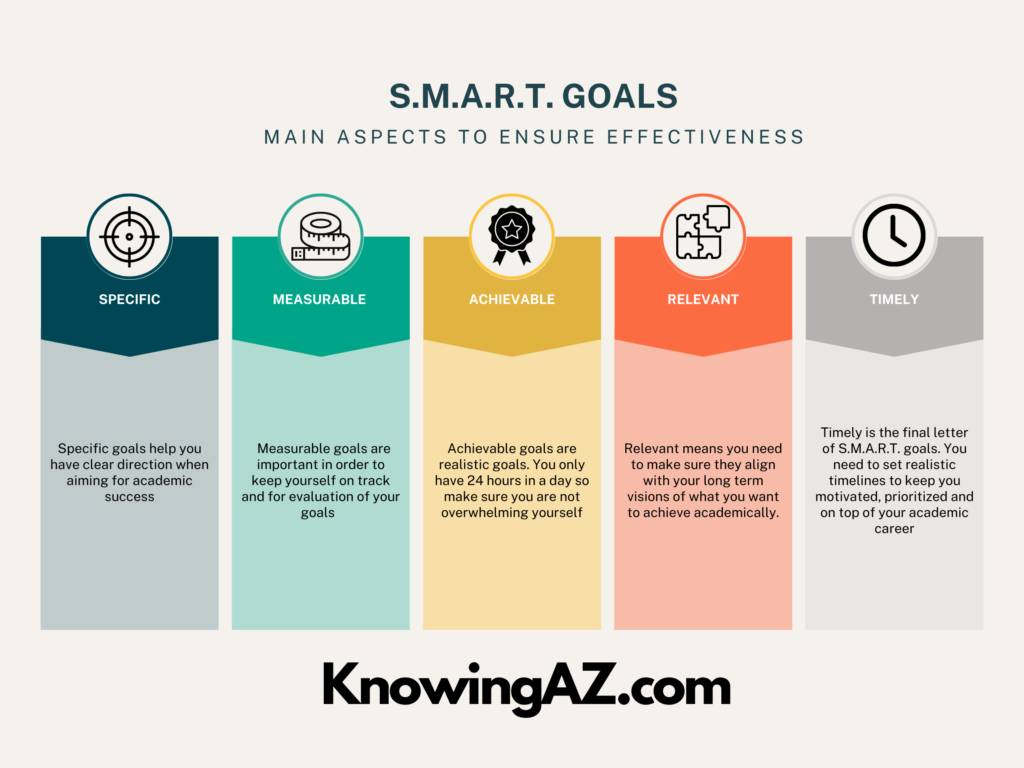Ten Tips for Mastering College Time Management (2023)
Why Time Management is Vital for College Students
In the whirlwind of college life, these ten tips for mastering college time management stands as a guiding beacon, illuminating the path to success. Whether you’re a freshman embarking on your academic journey or a seasoned upperclassman, the significance of managing your time effectively cannot be overstated. It is the cornerstone upon which academic excellence, reduced stress, and personal growth are built. But its importance extends far beyond the classroom – it helps you strike a harmonious balance between academics, extracurricular activities, and social life, shaping you into a well-rounded individual. As we delve into the world of higher education, the significance of time management becomes increasingly evident. In this article we will review 10 effective tips for managing your time in college and make sure to read to the end for a bonus tip!
Planning is essential and using the right planner is essential for any student. Mastering “college time management” is not just about squeezing more hours into your day; it’s about using your time effectively to achieve your goals. Successful college time management starts with planning. Create a weekly schedule that includes classes, study sessions, and deadlines. This can be done at the start of each week or month in order to track what you have upcoming and make sure you do not fall behind. After planning out your week or month it is important to prioritize. Not all tasks are created equal. Prioritize your academic responsibilities over other activities to maintain a healthy balance. Which leads us to our first tip, prioritizing with keywords.

Tip One: Prioritize Tasks with Keywords
Only having 24 hours a day poses a challenge. You need to prioritize the most important tasks because you can’t always take it all on at once. To master time management in college, kick-start your journey by employing a technique that weaves keywords into your priorities. Begin by recognizing the high-impact tasks, using search terms like “urgent assignments,” “upcoming exams,” or “important projects.” By focusing your energy on these tasks first, you’ll set a solid foundation for success. Once you understand your priorities you can make a schedule.
Tip Two: Create an Effective Schedule
In the ever-evolving landscape of college life, crafting a meticulously planned schedule is your compass to navigate the academic terrain. Create a daily and weekly roadmap, detailing your “study time,” “class hours,” and crucial “study breaks.” The secret to success lies in not only crafting this schedule but also maintaining a steadfast commitment to follow it consistently. Planners can be an effective way to schedule.
Our Top Amazon Planners for College Students.
Tip Three: Utilize Time Management Tools
Consider using time management tools like “calendar apps” or “task management apps” to help you stay organized and set reminders for deadlines. In the digital age, don’t underestimate the benefits of utilizing “calendar apps” or “task management apps.” These tools can be invaluable in helping you maintain an organized schedule and sending you timely reminders for those all-important deadlines.

Tip Four: Set SMART Goals
When setting your sights on academic and personal achievements, think “SMART goals.” By making your objectives Specific, Measurable, Achievable, Relevant, and Time-bound, you establish a framework for clear, trackable targets that keep you on course.
Specific goals help you have clear direction when aiming for academic success. Measurable goals are important in order to keep yourself on track and for evaluation of your goals. Achievable goals are realistic goals. You only have 24 hours in a day so make sure you are not overwhelming yourself. Relevant means you need to make sure they align with your long term visions of what you want to achieve academically. Timely is the final letter of S.M.A.R.T. goals. You need to set realistic timelines to keep you motivated, prioritized and on top of your academic career
Tip Five: Eliminate Distractions
In a world brimming with diversions like social media, it’s crucial to address distractions. “Removing distractions” and “setting boundaries” during study hours is paramount. Explore techniques such as “website blockers” and “silent study environments” to foster a focused mind. Make sure you block out specific times for studying throughout the week and find areas like libraries, study rooms or even utilize empty classrooms if your campus allows it. It is important to minimize your outside distractions in order to retain as much information as you can.
Tip Six: Time Blocking for Efficiency
Unlock the power of “time blocking” to allocate specific time slots for various tasks. By implementing this strategy, you create “study time blocks” and “productivity time slots” that promote efficient work and structured study sessions. These blocks allow you to delve deep into your studies, free from distractions or multitasking.
Simultaneously, you can establish “productivity time slots” where you concentrate on non-academic tasks, such as organizing your daily agenda, responding to emails, or working on personal projects. These periods are designed to enhance your overall efficiency and effectiveness.
What makes time blocking particularly effective is its ability to foster intense concentration. During a “study time block,” you commit yourself fully to your coursework, ensuring that you make the most of your study sessions. This focused dedication can significantly improve your understanding of the material and your overall retention.
Furthermore, the structured nature of time blocking brings a sense of organization and predictability to your daily routine. It enables you to proactively plan your day, allocate resources efficiently, and ensure that no critical tasks are left undone. In essence, time blocking empowers you to take control of your time, reduce the stress associated with academic demands, and cultivate a more balanced and productive college experience.
Tip Seven: Break Tasks into Smaller Steps
When confronted with challenging and complex tasks, it can be immensely helpful to adopt a systematic approach that involves “breaking them into manageable steps.” This practice essentially entails dissecting the larger, intimidating task into smaller, more digestible components. By embracing this method, you not only simplify the path to success but also foster a sense of control and organization in your work.
This strategy, often referred to as “task breakdown,” allows you to tackle each sub-component with a clearer focus, reducing feelings of overwhelm. It’s akin to disassembling a puzzle; you work on one piece at a time, gradually piecing together the complete picture. Additionally, setting “sub-goals” for each of these smaller tasks acts as a roadmap, guiding your progress and ensuring that you steadily move closer to your ultimate objectives.
For instance, if you’re facing a research paper, breaking it down might involve tasks like “literature review,” “data collection,” “outline creation,” “writing the introduction,” and so forth. Each of these steps can be treated as a sub-goal, making the entire writing process more manageable. By the time you complete each sub-goal, you’ll have made significant strides toward achieving the bigger goal, leading to a more efficient and less daunting journey to success.

Tip Eight: Master Study Techniques
Elevate your study game with a variety of “study techniques” like the “Pomodoro method,” “active learning,” and “efficient note-taking.” These proven strategies enhance productivity and deepen your understanding of the subject matter.
Tip Nine: Regularly Review and Adjust
In your pursuit of effective time management in college, it’s vital to remember that this is a journey of continual growth and refinement. Time management is not a one-size-fits-all solution but rather a skill that evolves over time to suit your unique needs and challenges. Regular introspection is your compass on this journey. It involves taking moments to reflect on your current time management practices. Ask yourself questions such as, “What’s working well for me?” and “Where am I facing challenges?” By conducting this self-analysis, you gain insight into your strengths and areas that require improvement.
This introspection fuels the power of “self-assessment.” It means critically evaluating your performance, learning from your experiences, and identifying areas where you can enhance your time management. Self-assessment is an ongoing process where you analyze your strategies and make informed decisions on what to retain and what to change.
“Continuous improvement” is the cornerstone of your journey. It involves implementing the changes you’ve identified through self-assessment and adapting your time management strategies to suit your evolving needs. For instance, if you find that a specific time management technique is not as effective as you’d hoped, you can experiment with different methods until you discover what works best for you.
The beauty of embracing this approach is that it not only optimizes your time management but also nurtures your capacity to adapt and grow in the face of academic and life challenges. By fine-tuning your skills through regular introspection, self-assessment, and continuous improvement, you’ll become a more resilient and effective college student, better equipped to navigate the ever-changing demands of university life.

Tip Ten: Seek Support and Resources
Seek Help When Needed If you’re struggling to manage your time effectively, don’t hesitate to seek assistance from academic advisors or counseling services available on campus. If you find yourself struggling with time management, remember, you’re not alone. Don’t hesitate to “seek assistance” from academic advisors, counseling services, or campus resources. These professionals are here to provide the guidance and support you need on your academic journey.
Bonus Tip: The Pomodoro Technique
A professor in college once told me about the Pomodoro technique. He said that you can think of your energy and focus levels while studying as a linear graph. At the start you may find it easy to focus but slowly as time continues your focus goes down along with energy levels. However, with periodic breaks you can refocus and bring your energy levels back up and end up making better use of your study times. A burnt out students metaphorical graph would look like a negative sloping straight line, but a student who takes periodic breaks even for five minutes graph would look more like a sine wave and overall which achieve more effective study time.
To follow the Pomodoro Technique, break your study sessions into focused intervals (e.g., 25 minutes) followed by short breaks. This technique enhances productivity while preventing burnout. Every 4 breaks take a 15-20 minute break and go for a walk or talk to someone to refresh.
Conclusion
“Ten Tips for Mastering College Time Management” serves as the ultimate blueprint for navigating the multifaceted terrain of higher education. By embracing the art of keyword-powered prioritization and crafting meticulously detailed schedules, you set yourself on a path to thrive in your academic pursuits and personal growth. These tips offer a treasure trove of strategies to maximize your productivity and efficiency, empowering you to excel both within and beyond the classroom. Keep in mind that the quest for enhanced time management is an ongoing journey, marked by continuous self-assessment and refinement. In the fast-paced world of college, where every second matters, these tips lay the foundation for academic excellence, holistic development, and a fulfilling college experience.
So, let “Ten Tips for Mastering College Time Management” be your guiding light as you embark on your journey to master the essential art of time management during your college years.. Remember to periodically review your schedule to make necessary adjustments. Stay flexible and adapt to changes in your workload.
Need some study fuel? Check out our post “Craving Pizza? Discover the Best Pizzerias in Phoenix, Arizona!“

